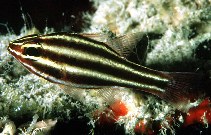| Family: |
Apogonidae (Cardinalfishes), subfamily: Apogoninae |
| Max. size: |
10 cm TL (male/unsexed) |
| Environment: |
reef-associated; marine; depth range 3 - 50 m |
| Distribution: |
Indo-Pacific: known from the Red Sea and Christmas Island in the Indian Ocean; ranging to the Tuamoto Islands, north to southern Japan, south to New Caledonia and Rapa. Western Indian Ocean: Mozambique (Ref. 41878). |
| Diagnosis: |
Dorsal spines (total): 8-8; Dorsal soft rays (total): 9-9; Anal spines: 2-2; Anal soft rays: 8-8. Characterized by having dorsal fin rays VII-I, 9; anal fin rays II,8; pectoral fin rays 14; pelvic fin rays I, 5; pored lateral line scales 24; predorsal scales 4; circumpeduncular scales 12; total gill rakers 24, developed gill rakers 18; snout pointed; body white in color (Ref. 93839). Further characterized by alternating black and yellow stripes, dark stripes wider; greatest depth of body 2.6-3.1 in SL (Ref. 90102). |
| Biology: |
Occurs on reef flats and shallow lagoon reef, usually seen singly or in pairs under ledges or in crevices. Feed on small benthic invertebrates at night (Ref. 2141). |
| IUCN Red List Status: |
Least Concern (LC); Date assessed: 10 December 2020 Ref. (130435)
|
| Threat to humans: |
harmless |
Source and more info: www.fishbase.org. For personal, classroom, and other internal use only. Not for publication.
